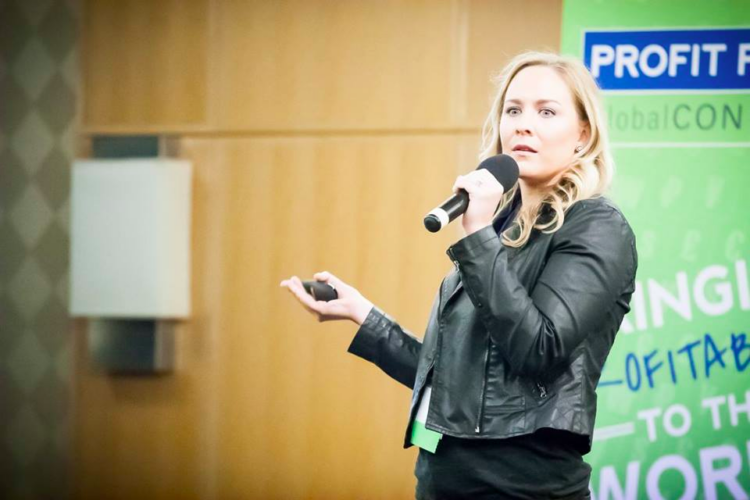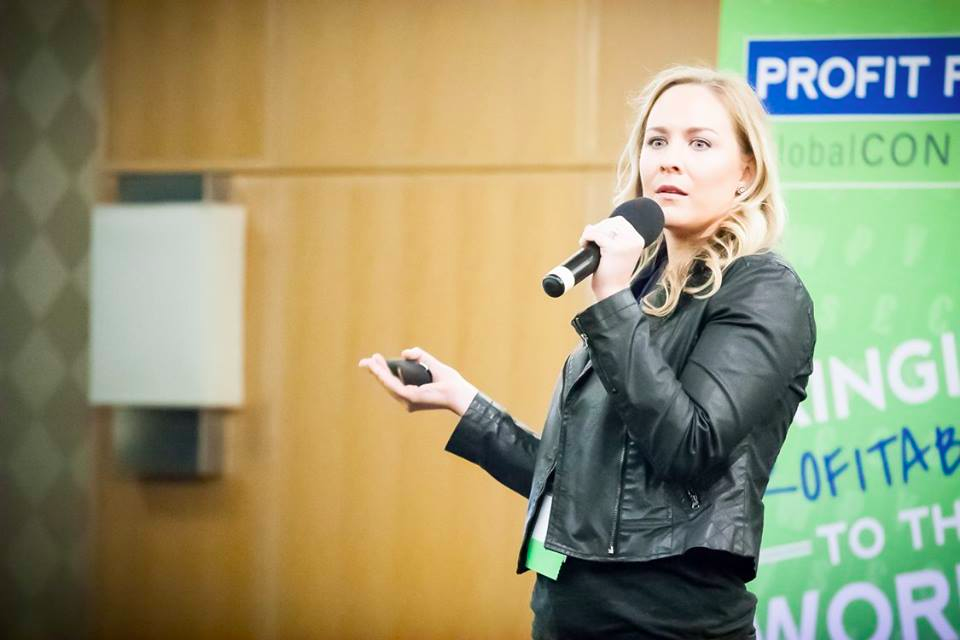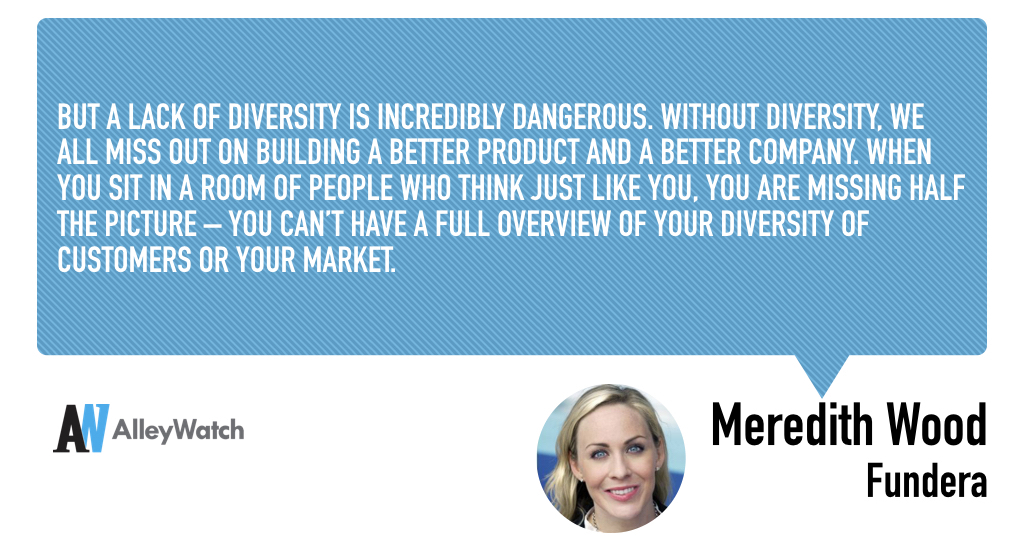Are you a woman in NYC Tech and interested in participating in this series? Make sure to read the whole article…
Much has been said and written about the lack of women in the tech sector, be it as investors (or associates), founders, or in management positions at major companies. Is the problem the old boys network – or that success in technology is seen as a young man’s game? In this series, we speak with some of the top women in tech in New York as they discuss the challenges they face, the perceptions that need to be changed and the work that’s being done – or not – to help to promote women in tech.
Today we speak with Meredith Wood, VP of Content and Editor-in-Chief at Fundera, an online marketplace for small business loans. Prior to Fundera, Meredith was the CCO at Funding Gates, an all-in-one receivables platform. Meredith has a long history of serving as an advocate for women in business and tech. As the only female VP on Fundera’s leadership team, Meredith knows first-hand the importance of having women in leadership roles that can lead by example. Sitting at the intersection of two male dominated fields – tech and finance, Meredith is an active columnist for Yahoo!, Fox Business, the SBA, and a number of other publications and she is using this voice to make sure that women have a seat at the table.
What’s your background and how did you develop your career as a female entrepreneur in the NYC tech ecosystem?
I have a background that I would never have predicted would lead me down this path. I have a degree in theater and I have been telling stories since I can remember. After graduation, I knew that theater wasn’t the life for me – there were too many elements out of my control. So, I spent my first few years in NYC trying to find what else interested me. I got a job at a financial firm, and quickly learned that while I enjoyed finance, a traditional finance firm wasn’t the right fit for me. It didn’t satisfy my creative side, and I found it too structured. I wanted a job where I could take more risks and be more creative.
This was right when the startup scene started to become hot in New York. I synced up with two founders starting a niche company called Funding Gates here in NYC, and I was presented with the opportunity for me to merge my interest in finance, my want for a more creative environment, and my passion for storytelling. As one of the first employees, I wore a lot of different hats– and because of that, I was able to identify where my past experience and skills would be best served. I quickly got into content marketing. Over time, I gained recognition both as a leader in content marketing, and in business/finance and entrepreneurship. I was interviewed and published in top business publications, and I generated meaningful traffic and revenue for that business.
Jared Hecht, someone who already had a name in the NYC Startup scene from his first company, GroupMe, had reached out to me and we connected over coffee a few times. He was starting a fintech company and he knew that content would play a crucial role in growing the business. I loved Fundera’s business model and mission, so I decided to join the team.
I was one of the first employees at Fundera and today we’ve built the content team into the largest, highest quality, and most profitable acquisition channel for the company.
I am continuing to push myself forward as a leader in the entrepreneur space. In addition to running columns on sites like Entrepreneur and Forbes, I also byline articles and speak on the subjects of small business, entrepreneurship, and financing.
At Fundera, I’ve risen to the VP level, and I am the only woman on the leadership team, which I see as a big responsibility. While we at Fundera are passionate about helping all entrepreneurs grow their businesses, I’ve developed a passion for women entrepreneurs specifically. We’ve done things like leading a program with the SBA to educate women about their access financing or put together reports that survey the data and landscape of female entrepreneurship.
The fact is, fintech sits at the intersection of two industries notorious for lacking female representation: finance and technology. I see my role in the industry as a thought leader across both those verticals.
What are the advantages of being a woman in tech?
Tech doesn’t really have any sort of playbook and I think that can be a huge advantage for women. A lot of these companies are young and they’re still structuring and figuring out how they promote people. Their corporate ladders are less rigid than at larger, more established companies. In many cases, that can give women the opportunity to advance into senior roles and take on greater responsibilities more quickly. When more women are in these leadership positions, they can look out for other women along the way.
Another advantage of being a woman in tech is that, while the industry is far from perfect, there is a fantastic community of strong women and men who keep diversity top of mind. Many people in the tech community do consider diversity in gender and race with respect to company culture, recruiting, and leadership.
I also think that the women in the tech/startup community are especially resilient and committed to helping each other advance. The community has a lot of great organizations dedicated to helping women be successful in their roles – ranging from engineers, to sales, to everything in between. As a woman in this industry, you have the opportunity to build a network of smart, ambitious, and kind people who can mentor you as you develop your career.
What can be done to further promote female entrepreneurs and women in tech in New York?
More people need to be a part of this conversation. While I think there are a lot of allies out there, they don’t always do enough to take action and execute on policies that would create real change. There’s nothing worse than feeling like you are the woman constantly bringing up women’s issues – it should never be viewed as a crutch, and women should not have to fear appearing emotional or weak for discussing women’s issues in the workplace. In order to push the conversation forward, we need other people to help address problems and speak up when they witness impropriety or unfairness.
While women’s groups have been successful at creating supportive communities for women at many startups, I also think it’s really helpful to include men in the events, workshops, and conversations they host. Everyone needs to work together to address some of the structural and cultural barriers preventing women from reaching their potential, and it starts with including all perspectives in the conversation.
What is diversity to you and do you see it evolving in tech?
Diversity has obvious benefits: the more diversity in race and gender, the more variety of experiences and perspectives, the better.
But a lack of diversity is incredibly dangerous. Without diversity, we all miss out on building a better product and a better company. When you sit in a room of people who think just like you, you are missing half the picture – you can’t have a full overview of your diversity of customers or your market.
Recruiting and mentoring with an eye toward diversity is the best way to run a business, and it goes far beyond gender. It’s about making an active effort to employ people of different backgrounds so that you can represent different experiences and ideas. That attitude steers everyone toward a more well-rounded company culture and it also helps with recruiting.
The tech community is young. As an industry, we’ve yet to encounter a lot of the larger institutional issues that older, more established industries have grappled with. Family-leave policies and work-life balance become far more important as the average age of employees increases. Now that the industry is maturing and we have more diversity in employee age, it’s the time to come together and navigate these issues.
My hope is that the tech community will evolve and learn from strategies tested by larger companies. Once we can identify trends around dropout rates and other factors, we can figure out how to best invest in employees to build a positive culture for working people who want to balance time with their families.
Why do you think it’s important that women retain, grow, and develop into senior roles within their organizations?
It’s important for a number of reasons. Firstly, recruiting is very tough when there is a lack of women at the top. Candidates – particularly young ambitious women – notice the lack of representation in leadership.
In the shorter term, without women in leadership roles, we miss out in important perspectives – especially when it comes to making inclusive policies for the workplace. Issues like parental leave, personnel policy, and workplace culture are best served by a diverse set of perspectives, and it’s a lot easier to arrive at the right outcome when people with experience weigh in.
Women in leadership also play an important role in mentoring younger women and setting an example of different communication styles in the workplace. A mentor can make a huge difference in the way young professionals deal with the daily challenges of personal and professional growth.
It’s especially important for more experienced women to act as sounding boards for their younger colleagues, increasing their confidence and ensuring fair and equal treatment. Research has shown that women are less likely to ask for raises or promotions, and are less likely than their male counterparts to apply for a position for which they don’t meet every qualification.
But shifting that culture requires change from all of us, and it’s not always easy. I often find myself giving younger women advice that I don’t always follow myself. The more women in leadership positions, the higher chance we can influence our company cultures to be mindful of these subtle biases and fight against them.
How can women rise in the ecosystem and what are the unseen barriers?
First and foremost, women need mentors. It makes a huge difference to have someone who is not your boss to discuss situations honestly with and help you navigate challenges and decisions.
Women can also rise in the ecosystem by speaking up and asking for what we want. One of the largest unseen barriers holding women back is that we are often afraid or unwilling to ask for raises or promotions when they are deserved. One way to do that is to come to the negotiating table with metrics, ready to talk about how you have contributed. It’s hard to argue with numbers.
Fostering a culture of feedback and an internal support system can also go a long way. For example, one on one check-ins with managers can also help women reflect on their work so that they can benchmark where they need to be to get promoted.
Creating a comfortable environment with open feedback and mentorship is essential, and it’s on all of us to create that culture. Sometimes, that requires women to speak up when we feel alienated or uncomfortable.
Please tell us about a few organizations that you are involved with or respect that are promoting women in tech.
Although I’ve only seen their work briefly, I have a lot of respect for the work CloserIQ is doing to host events for women to learn about the industry. We recently partnered with CloserIQ to host a women in sales event at our headquarters, which featured several amazing female sales professionals as panelists. That kind of exposure is really helpful for younger women in sales to plan their careers and have access to these amazing women that have career advice anyone can learn from.
This past year at Fundera, I was proud to launch our own internal women’s group. Every woman employee participates in the group, and it’s a great support system to set goals and hold each other accountable. Another part of the group’s purpose is to brainstorm ways to make our company’s culture more inclusive and to plan events that bring the whole company together. It has been amazing to see the community we’ve established within our own company and the platform it’s created for women to discuss our careers at a higher level.
What can men do to participate in this discussion?
There are a couple of things men can do to participate. First and foremost, if your company has any sort of organization dedicated to women, ask if you can be included or invited to some of their events. The first step is to show interest, whether that means attending events in your community or participating in the conversation. Meet the women who are leading the charge in your industry and hear from them about how you can contribute as an ally.
It’s also important to use your position as a man to speak up when you witness inappropriate behavior. The more people willing to speak out against everyday examples of sexist behavior – both overt and subconscious – the easier it is to get to the root of the problem.
Another way that men can really make a difference on this issue is when it comes to recruiting. If you are a manager hiring for a position, and you know there is a lack of diversity on your team, you may have to work harder to attract female applicants and get them through the process. That’s particularly true in sales and engineering. Our VP of Sales at Fundera has had work extremely hard to diversify our team and he’s been a true ally of women every step of the way. Today, ⅔ of the managers on his team are women.
It all starts with admitting there is a discussion. If you work with or manage women, have an open dialogue with them about whether or not the culture is meeting their needs, and ask what you can do to make them feel more comfortable.
The team at AlleyWatch believes it’s important to have an inclusive discussion around the challenges facing women in tech along with highlighting the work of the female entrepreneurs that have made NYC one of the best places for women in tech according to some recent studies. That’s why we are running this series that showcases women in tech in New York.
If you are a female founder in NYC working in tech and interested in participating in the series please visit this link or click on the image above.
Please feel free to pass this on to any women in NYC that you feel should be considered for the series. Thank you.






